| Listing 1 - 10 of 10 |
Sort by
|
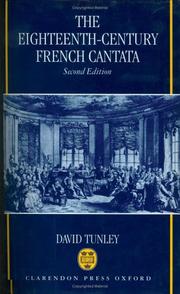
ISBN: 0198164394 Year: 1997 Publisher: Oxford : Clarendon Press,
Abstract | Keywords | Export | Availability | Bookmark
 Loading...
Loading...Choose an application
- Reference Manager
- EndNote
- RefWorks (Direct export to RefWorks)
Cantata --- France --- 18th century
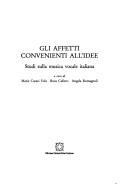
ISBN: 8871046277 9788871046273 Year: 1993 Volume: 3 Publisher: Napoli : Edizioni scientifiche italiane,
Abstract | Keywords | Export | Availability | Bookmark
 Loading...
Loading...Choose an application
- Reference Manager
- EndNote
- RefWorks (Direct export to RefWorks)
Vocal music --- Musique vocale --- History and criticism. --- Histoire et critique --- Cantata --- Church music --- Opera --- History and criticism --- Cantata - Italy - History and criticism --- Church music - Italy --- Opera - Italy
Book
ISBN: 9780190269562 9780190269579 Year: 2017 Publisher: New York (N.Y.) : Oxford university press,
Abstract | Keywords | Export | Availability | Bookmark
 Loading...
Loading...Choose an application
- Reference Manager
- EndNote
- RefWorks (Direct export to RefWorks)
Book
ISBN: 2130499740 9782130499749 Year: 1999 Volume: 3476 Publisher: Paris PUF
Abstract | Keywords | Export | Availability | Bookmark
 Loading...
Loading...Choose an application
- Reference Manager
- EndNote
- RefWorks (Direct export to RefWorks)
Music --- anno 1700-1799 --- France --- Cantata --- Cantate --- Cantatas --- History and criticism --- History and criticism. --- 78.77.4
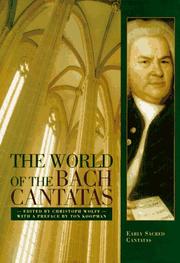
ISBN: 0393041069 Year: 1997 Publisher: New York (N.Y.): Norton
Abstract | Keywords | Export | Availability | Bookmark
 Loading...
Loading...Choose an application
- Reference Manager
- EndNote
- RefWorks (Direct export to RefWorks)
Cantata --- Cantate --- Cantatas --- -Cantatas (Mixed voices) --- Choruses --- History and criticism --- Bach, Johann Sebastian. --- -History and criticism --- Bach, Jean-Sébastien --- Bach, Johann Sebastian,
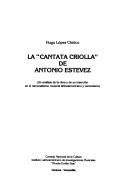
ISBN: 9802920266 9789802920266 Year: 1987 Volume: 6 Publisher: Caracas Consejo Nacional de la Cultura. Instituto Latinoamericano de Investigaciones Musicales "Vicente Emilio Sojo"
Abstract | Keywords | Export | Availability | Bookmark
 Loading...
Loading...Choose an application
- Reference Manager
- EndNote
- RefWorks (Direct export to RefWorks)
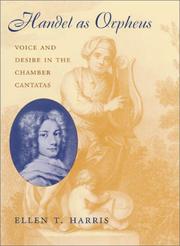
ISBN: 0674006178 Year: 2001 Publisher: Cambridge Harvard University Press
Abstract | Keywords | Export | Availability | Bookmark
 Loading...
Loading...Choose an application
- Reference Manager
- EndNote
- RefWorks (Direct export to RefWorks)
Cantata --- Cantate --- Homoseksualiteit en muziek --- Homosexuality and music --- Homosexualité et musique --- Cantatas --- Homosexuality and music. --- History and criticism. --- Handel, George Frideric --- Handel, George Frideric, - 1685-1759. - Cantatas. --- Kamercantates --- Duitsland --- Handel, George Frideric (1685-1759) --- 18e eeuw --- 17e eeuw
Book
ISBN: 2221007492 9782221007495 Year: 1982 Publisher: Paris Laffont
Abstract | Keywords | Export | Availability | Bookmark
 Loading...
Loading...Choose an application
- Reference Manager
- EndNote
- RefWorks (Direct export to RefWorks)
Cantata --- Cantate --- Bach, Johann Sebastian, --- Cantatas --- History and criticism --- -Cantatas (Mixed voices) --- Choruses --- Bach, Johann Sebastian. --- -History and criticism --- Bach, Jean-Sébastien --- History and criticism. --- Cantatas (Mixed voices) --- Cantatas - Germany - 18th century - History and criticism --- Bach, Jean Sébastien --- Bach, Johann Sebastian, - 1685-1750 - Cantatas
Book
ISBN: 9781107116474 1107116473 9781107538849 110753884X 9781316337400 9781316375068 1316375064 1316337405 9781316379066 131637906X 9781316378069 1316378063 1316372065 1316376060 1316377067 1316366065 Year: 2015 Publisher: Cambridge Cambridge University Press
Abstract | Keywords | Export | Availability | Bookmark
 Loading...
Loading...Choose an application
- Reference Manager
- EndNote
- RefWorks (Direct export to RefWorks)
This is the first musicological study entirely devoted to a comprehensive analysis of musical Holocaust representations in the western art music tradition. Through a series of chronological case studies grounded in primary source analysis, Amy Lynn Wlodarski analyses the compositional processes and conceptual frameworks that provide key pieces with their unique representational structures and critical receptions. The study examines works composed in a variety of musical languages - from Arnold Schoenberg's dodecaphonic A Survivor from Warsaw to Steve Reich's minimalist Different Trains - and situates them within interdisciplinary discussions about the aesthetics and ethics of artistic witness. At the heart of this book are important questions about how music interacts with language and history; memory and trauma; politics and mourning. Wlodarski's detailed musical and cultural analyses provide new models for the assessment of the genre, illustrating the benefits and consequences of musical Holocaust representation in the second half of the twentieth century.
Holocaust, Jewish (1939-1945), in music. --- Judenvernichtung. --- Musik. --- Schoenberg, Arnold, --- Adorno, Theodor W., --- Eisler, Hanns, --- Reich, Steve, --- Criticism and interpretation. --- Jüdische Chronik. --- Music --- Adorno, Theodor W. --- Wiesengrund, Theodor, --- Wiesengrund-Adorno, Theodor, --- Adorno, Teodor V., --- Adorŭno, --- אדורנו, תאודור --- אדורנו, ת. ו. --- Adorno, Th. W. --- Jüdische Chronik. --- Jewish chronicle --- Jewish chronicle (Cantata)
Book
ISBN: 0520957709 9780520957701 9780520281868 0520281861 1306417155 9781306417150 Year: 2014 Publisher: Berkeley
Abstract | Keywords | Export | Availability | Bookmark
 Loading...
Loading...Choose an application
- Reference Manager
- EndNote
- RefWorks (Direct export to RefWorks)
Joy H. Calico examines the cultural history of postwar Europe through the lens of the performance and reception of Arnold Schoenberg's A Survivor from Warsaw-a short but powerful work, she argues, capable of irritating every exposed nerve in postwar Europe. Schoenberg, a Jewish composer whose oeuvre had been one of the Nazis' prime exemplars of entartete (degenerate) music, immigrated to the United States and became an American citizen. Both admired and reviled as a pioneer of dodecaphony, he wrote this twelve-tone piece about the Holocaust in three languages for an American audience. This book investigates the meanings attached to the work as it circulated through Europe during the early Cold War in a kind of symbolic musical remigration, focusing on six case studies: West Germany, Austria, Norway, East Germany, Poland, and Czechoslovakia. Each case is unique, informed by individual geopolitical concerns, but this analysis also reveals common themes in anxieties about musical modernism, Holocaust memory and culpability, the coexistence of Jews and former Nazis, anti-Semitism, dislocation, and the presence of occupying forces on both sides of the Cold War divide.
MUSIC / History & Criticism. --- HISTORY / Europe / General. --- MUSIC / Genres & Styles / Classical. --- Schoenberg, Arnold, --- Shenberg, Arnolʹd, --- Schönberg, Arnold, --- Schenberg, A. --- Shenberg, A. --- שנברג, ארנולד --- Appreciation --- Music --- History --- Genres & Styles --- Classical. --- Europe --- General. --- History & Criticism. --- Schönberg, Arnold --- 20th century world history. --- a survivor in warsaw. --- anti semitism. --- arnold schoenberg. --- austria. --- austrian composer. --- cantata. --- chromatic scale. --- cold war. --- composer. --- cultural history. --- czechoslovakia. --- death camps. --- death. --- degenerate music. --- dodecaphony. --- east germany. --- geopolitical concerns. --- geopolitics. --- holocaust victims. --- holocaust. --- jewish composer. --- lens of performance. --- mass death. --- memory. --- music. --- musical modernism. --- nazi. --- norway. --- poland. --- postwar europe. --- reception studies. --- second world war. --- twelve tone technique. --- west germany. --- world history.
| Listing 1 - 10 of 10 |
Sort by
|

 Search
Search Feedback
Feedback About UniCat
About UniCat  Help
Help News
News